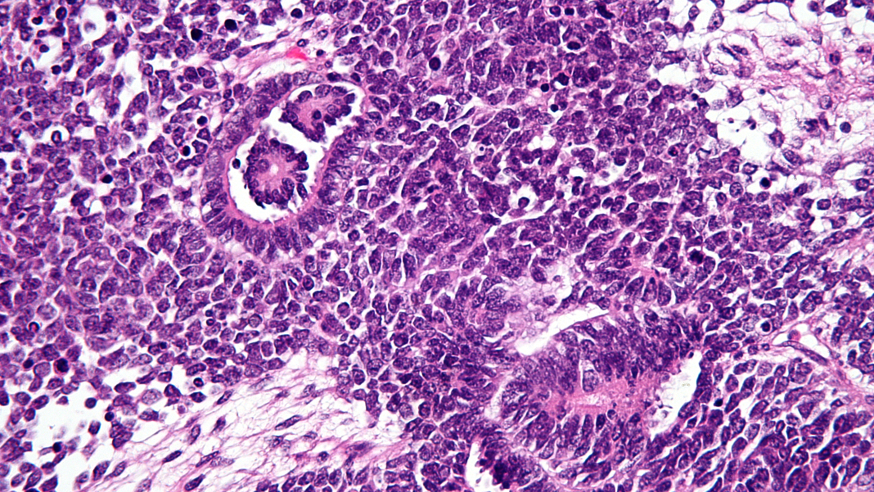
Image: Wilms tumour. Image credit: Copyright © 2011 Michael Bonert. Licence: CC BY-SA 3.0.
Scientists have identified a new genetic cause of a childhood kidney cancer called Wilms tumour – revealing insights into how loss of control of chromosome number can lead to cancer.
Their study will help parents understand why their children have developed cancer and provide information about the risk of cancer for other children.
It has also provided valuable information about the fundamental biology of cancer, by shedding new light on how the disease may be linked to disruptions to the process for distributing chromosomes between cells when cells divide.
Scientists at The Institute of Cancer Research, London, and the Hubrecht Institute-KNAW in the Netherlands studied families with a rare genetic syndrome that affects chromosome number to try to identify mutations linked to Wilms tumour.
1 in 10,000 children
Wilms tumour affects about 1 in 10,000 children, but fortunately is curable in about 90% of cases. It has been linked to several different genetic syndromes, one of which is called ‘mosaic variegated aneuploidy (MVA) syndrome’.
Children with MVA syndrome have cells with the wrong number of chromosomes, a condition called aneuploidy. Some cells have too many chromosomes whilst others have too few.
Researchers used a technique called exome sequencing to analyse all the genes in 20 families with MVA. They discovered mutations in a gene called TRIP13 in three of them.
Interestingly, the data suggested that ancestors of all three children originated from the Azad Kashmir region of Pakistan.
So the researchers next looked at UK children with Wilms tumour with ancestors from Azad Kashmir, but without MVA, and found two with the same TRIP13 mutations. They also identified a child from Norway with Wilms tumour caused by different TRIP13 mutations.
Essential proteins
The findings of the study, which was funded by Wellcome, the Netherlands Organisation for Scientific Research and the Dutch Cancer Society, were published in the journal Nature Genetics.
When a cell divides into two cells, the 23 pairs of chromosomes are first duplicated and then split up so that each new cell has 23 pairs of chromosomes. This process is very tightly controlled, because if anything goes wrong cells can end up with the wrong number of chromosomes.
Professor Nazneen Rahman’s Genetic Susceptibility Team aims to identify, characterise and clinically implement genetic predispositions to a variety of cancers, particularly breast, ovarian, testicular and childhood cancers.
Find out more
TRIP13 codes for one of the essential proteins in machinery involved in checking that chromosomes are all lined up correctly, ready to be sorted into the new cells before cell division starts. The researchers previously showed that BUB1B, another essential gene in this process, is also linked to MVA and childhood cancer.
Aneuploidy is a hallmark of cancer cells, so it is not so surprising that children with MVA are also at risk of cancer.
However, the researchers showed that not all children with MVA are at high risk of cancer. Children with MVA due to BUB1B or TRIP13 mutations are at high cancer risk, particularly of Wilms tumour.
An important discovery
But children with MVA due to other causes, or in whom the cause is currently unknown, were not at high risk of childhood cancer in this study. This is important because it suggests that it is the underlying mechanism leading to aneuploidy, rather than simply having the wrong number of chromosomes, that is important in cancer.
Study leader Professor Nazneen Rahman, Head of Genetics at the ICR, said: “This study has been of immediate use to families in providing a reason for why their child developed cancer, and information about risks to other children, which is very rewarding. Equally importantly, the study has provided new information about how aneuploidy and cancer are linked – a topic that has been hotly debated and intensively researched for many decades.”
Co-study lead Dr Geert Kops, from the Hubrecht Institute-KNAW, Utrecht, said: “This was a gratifying collaboration as it allowed us to focus our molecular expertise towards understanding the cause of cancer in children and it has also driven forward our research into the control of chromosome segregation.”